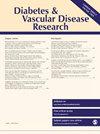Sleep behaviours and associated habits and the progression of pre-diabetes to type 2 diabetes mellitus in adults: A systematic review and meta-analysis
IF 3
4区 医学
Q3 ENDOCRINOLOGY & METABOLISM
引用次数: 6
Abstract
Introduction Certain sleep behaviours increase risk of type 2 diabetes mellitus (T2DM) in the general population, but whether they contribute to the progression from pre-diabetes to T2DM is uncertain. We conducted a systematic review to assess this. Methods Structured searches were performed on bibliographic databases (MEDLINE, EMBASE and CINAHL) from inception to 26/04/2021 for longitudinal studies/trials consisting of adults⩾18 years with pre-diabetes and sleep behaviours (short or long sleep duration (SD), late chronotype, insomnia, obstructive sleep apnoea, daytime napping and/or night-shift employment) that reported on incident T2DM or glycaemic changes. The Newcastle-Ottawa Scale was used for quality assessment. Results Six studies were included. Meta-analysis of three studies (n = 20,139) demonstrated that short SD was associated with greater risk of progression to T2DM, hazard ratio (HR) 1.59 (95% CI 1.29-1.97), I2 heterogeneity score 0%, p < 0.0001, but not for long SD, HR 1.50 (0.86–2.62), I2 heterogeneity 77%, p = 0.15. The systematic review showed insomnia and night-shift duty were associated with higher progression to T2DM. Studies were rated as moderate-to-high quality. Conclusions Progression from pre-diabetes to T2DM increases with short SD, but only limited data exists for insomnia and night-shift duty. Whether manipulating sleep could reduce progression from pre-diabetes to T2DM needs to be examined.睡眠行为和相关习惯与成人糖尿病前期到2型糖尿病的进展:一项系统回顾和荟萃分析
引言某些睡眠行为会增加普通人群患2型糖尿病(T2DM)的风险,但它们是否会导致糖尿病前期向T2DM的进展尚不确定。我们对此进行了系统的审查。方法从一开始到2021年4月26日,在书目数据库(MEDLINE、EMBASE和CINAHL)上进行结构化搜索,以进行纵向研究/试验,这些研究/试验由患有糖尿病前期和睡眠行为(睡眠时间短或长(SD)、晚型、失眠、阻塞性睡眠呼吸暂停、,白天打盹和/或夜班工作),其报告了T2DM事件或血糖变化。纽卡斯尔-渥太华量表用于质量评估。结果纳入6项研究。对三项研究(n=20139)的荟萃分析表明,短SD与更大的进展为T2DM的风险相关,危险比(HR)1.59(95%CI 1.29-1.97),I2异质性得分0%,p<0.0001,但与长SD无关,HR 1.50(0.86-2.62),I2-异质性77%,p=0.15。系统综述显示,失眠和上夜班与更高的T2DM进展有关。研究被评为中等至高质量。结论从糖尿病前期到T2DM的进展随着SD的缩短而增加,但失眠和夜班的数据有限。控制睡眠是否可以减少从糖尿病前期到T2DM的进展,还有待研究。
本文章由计算机程序翻译,如有差异,请以英文原文为准。
求助全文
约1分钟内获得全文
求助全文
来源期刊

Diabetes & Vascular Disease Research
ENDOCRINOLOGY & METABOLISM-PERIPHERAL VASCULAR DISEASE
CiteScore
4.40
自引率
0.00%
发文量
33
审稿时长
>12 weeks
期刊介绍:
Diabetes & Vascular Disease Research is the first international peer-reviewed journal to unite diabetes and vascular disease in a single title. The journal publishes original papers, research letters and reviews. This journal is a member of the Committee on Publication Ethics (COPE)
 求助内容:
求助内容: 应助结果提醒方式:
应助结果提醒方式:


